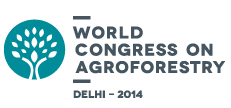The Master TreeGrower and Peer Group Mentoring programs: building farmer and community capacity
The Master TreeGrower and Peer Group Mentoring programs: building farmer and community capacity
wca2014-1281 Rowan Reid 1 2,* 1Australian Agroforestry Foundation, Birregurra, 2Forest and Ecosystem Science, The University of Melbourne, Melbourne, AustraliaThe first 8-day, Australian Master TreeGrower (MTG) program was run in 1996 as an outreach program of the University of Melbourne. Since then, more than 100 MTG programs have been run across Australia involving over 2000 landholders. The award-winning capacity building program encourages farmers to truly aspire to be ‘master tree growers’ and provides some of the knowledge, skills and support required to launch them on that lifetime journey. Independent evaluation shows that participants enthusiastically support the program, increase the area and management of trees, are more inclined to provide a mix of both public and private good outcomes, and actively encourage others in their community to do the same. The Australian Agroforestry Foundation is now also extending the Peer Group Mentoring (PGM) concept developed by a farmer group in Australia (Otway Agroforestry Network) that trains then pays farmers to support others as they design and develop their own agroforestry projects.
In 2012 the foundation (with Beyond Subsistence) hosted a tour of African professionals to explore the adaptation and application of the MTG and PGM for Africa. This led to the first African MTG course in 2013 and the formation of the Kabale Agroforestry Network in Uganda. The aim was to facilitate the development of agroforestry and native vegetation management on farms in ways that reflect the aspirations and opportunities of local farmers. This contrasts markedly with many other programs that seek to entice farmers, with direct incentives, to adopt forestry models judged by outsiders as being the most viable.
This paper presents the philosophy underpinning the MTG and PGM models and the results of our evaluations to highlight the potential of building farmer capacity and facilitating community leadership in the development of agroforestry practices. We show that, when faced with the design and management of locally appropriate multipurpose agroforestry systems, farmers from Africa and Australia have much in common and that the MTG and PGM models are transferable. More importantly, we demonstrate that agroforestry practices will be more diverse, spontaneous and sustainable when founded on landholder and community needs, a combination of local and conventional knowledge and information networks that engage farmers as equals alongside industry, NGOs and governments.

